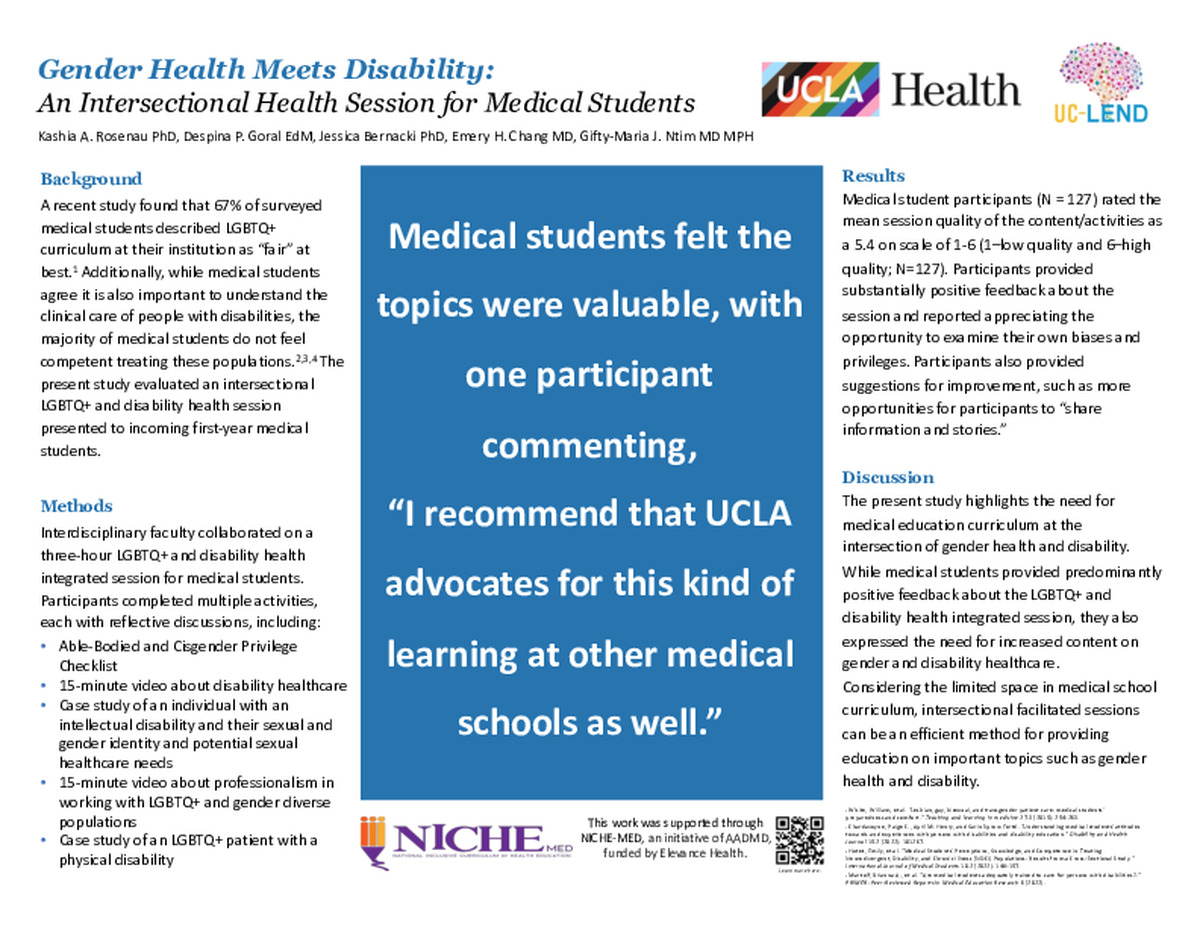
-
Author
Kashia Rosenau -
Poster Title
Gender Health Meets Disability: An Intersectional Health Session for Medical Students
-
Author(s)
Kashia A. Rosenau PhD, Despina P. Goral EdM, Jessica Bernacki PhD, Emery H. Chang MD, Gifty-Maria J. Ntim MD MPH
-
Contact Author Email
krosenau@mednet.ucla.edu
-
Poster Abstract
Background: A recent study found that 70% of gender diverse participants reported negative interactions with a healthcare provider in the last year. Looking at medical education, 67% of surveyed medical students described LGBTQ+ curriculum at their institution as “fair” at best. Additionally, surveys of medical trainees at various institutions have found that, while students agree it is important to understand the clinical care of people with disabilities, the majority of medical students do not feel competent treating these populations, or if they have received disability-specific training, still feel it has been inadequate. The present study focuses on increasing medical school curriculum at the intersection of LGBTQ+ and disability.
Specific Aims: This study aims to evaluate an intersectional LGBTQ+ and disability health session presented to incoming first-year medical students.
Materials and Methods: Faculty from LGBTQ+ health, gender health and neurodevelopmental disability programs collaborated on a three-hour LGBTQ+ and disability health integrated session that was delivered during the first month of medical school curriculum. Incoming medical students were put into small groups, each with two facilitators: one from the LGBTQ+ Champion program and one from the Disability program. Participants completed multiple activities, each with reflective discussions, including:
- Completing an Able-Bodied and Cisgender Privilege Checklist
- Watching a 15-minute video about disability healthcare
- Reviewing a case study involving an individual with an intellectual disability and their sexual and gender identity and potential sexual healthcare needs
- Watching a 15-minute video about professionalism in working with LGBTQ+ and gender diverse populations
- Reviewing a case study about an LGBTQ+ patient with a physical disability.
The facilitators led discussions utilizing prompts from the facilitator guide. At the conclusion of the session, participants rated the session on a 6-point Likert-type scale (1–low quality and 6–high quality) and responded to open-ended questions about session content and delivery.
Results: Medical student participants rated the mean session quality of the content/activities as a 5.4 on scale of 1-6 (N=127).
Participants provided substantially positive feedback about the session and reported appreciating the opportunity to examine their own biases and privileges. Participants valued the discussions with their classmates and particularly appreciated the clinicians with experience working with these populations and/or who identified as members of these communities. Participants felt the topics were valuable and reported feeling better prepared to work with diverse populations after completing this session.
Participants also provided suggestions for improvement. One participant suggested providing more opportunities for participants to “share information and stories,” as “lived experiences are powerful.” Another participant observed that “several students didn’t feel equipped to talk about these topics.”
Conclusions: The present study highlights the need for medical education curriculum at the intersection of gender health and disability. While medical students provided predominantly positive feedback about the LGBTQ+ and disability health integrated session, they also expressed the need for increased content on gender and disability healthcare. Considering the limited space in medical school curriculum, intersectional facilitated sessions can be an efficient method for providing education on important topics such as gender health and disability.
-
Keywords
disability, LGBTQ+
-
Poster PDF

